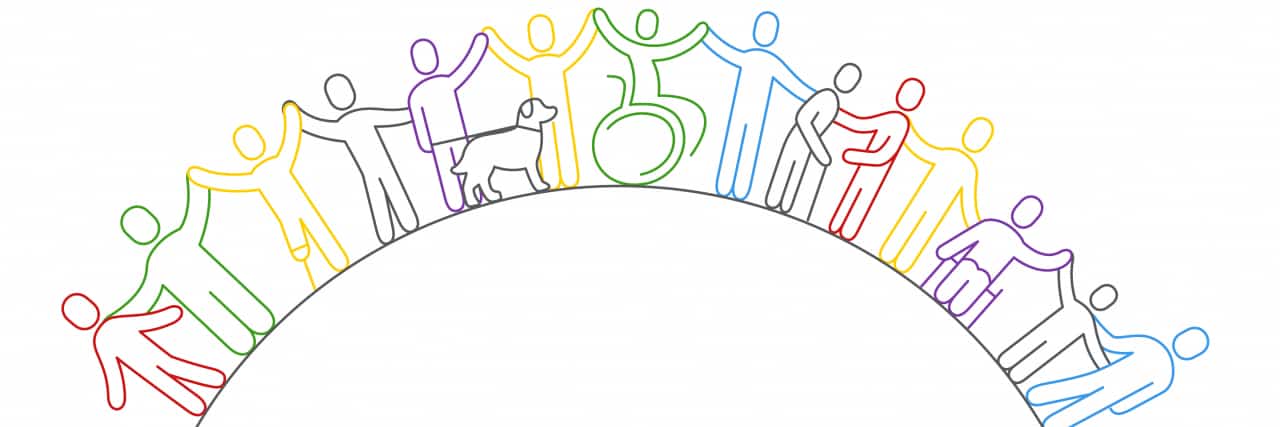5 Ways Non-Disabled People Can Support the Disability Community During Disability Pride Month
July is Disability Pride Month — a time for people with disabilities to acknowledge the history of the disability community and the long, ongoing fight for disability rights. It’s also a month focused on sharing personal stories of disability and outwardly celebrating identifying as disabled. This month, it’s important for able-bodied people to recognize why Disability Pride Month exists and understand that they can support the disability community while still keeping the focus on people with disabilities. Here are five ways able-bodied people can support people with disabilities during Disability Pride Month.
1. Give people with disabilities a safe space to share their stories during Disability Pride Month.
Disability Pride Month is full of articles and social media posts about managing symptoms and coming to terms with life with a disability — but being so vulnerable isn’t always easy. Some people in the disability community are new to self-identifying as disabled or sharing their personal experiences with disability, so it’s important to be as respectful and validating as possible. Show that you’re a safe person to share disability stories with by showing empathy and validating others’ lived experiences — while still recognizing that you won’t be able to fully understand what life with a disability is like. People with disabilities may be much more likely to open up to able-bodied friends and loved ones when they know they’re empathetic without assuming they know all of the nuances of being disabled.
2. Read up on disability history this Disability Pride Month.
Disability Pride Month celebrates disability history — from the first self-advocates to fight for accessibility, education, employment rights, and resources for people with disabilities to those in the disability community who continue to push for equality for people with health conditions. Disability history is rarely taught in school, and it’s dark and sordid, but it contextualizes the disability justice movement and can serve as a reminder of why disability rights are so important. Reading up on disability history as an able-bodied person can bring institutionalization, disability discrimination, the disability rights movement, and the need for continuing advocacy to light and emphasize how far the disability community has come — and how far society still needs to go to treat people with disabilities equally to their able-bodied peers.
3. Shop small businesses owned by people with disabilities for Disability Pride Month.
If you love shopping and want to be intentional about the businesses you support, try shopping businesses owned by people with disabilities. With unemployment rates higher in the disability community than among able-bodied people, shopping businesses that are run by or employ people with disabilities can help maintain lasting, sustainable work opportunities in the disability community. There are plenty of disabled-owned businesses to buy from, like URevolution, Rebirth Garments, Unhidden Clothing, Colletty’s Cookies, Ingenue Candle Company, and Candy Doll Club, and others. They sell everything from adaptive clothing to pins to sweet treats. Shopping disabled- and neurodiverse-owned businesses lets you “shop small” and support an underemployed community too.
4. Donate to reputable disability organizations during Disability Pride Month.
Disability nonprofits thrive on donations, and now’s the perfect time to donate to an organization you support. When you donate, research organizations that are founded by or actively backed by the disability community — some disability organizations actively work against the disability community because they aren’t founded or run by people with disabilities themselves. Donating to organizations like the Autistic Self Advocacy Network, the National Down Syndrome Society, ADAPT, or the National Council on Independent Living can help advance advocacy and provide necessary resources for people with disabilities.
5. Teach your children about Disability Pride Month and people with disabilities.
Many people with disabilities grew up hearing other children’s parents refuse to answer questions about disabilities — but times are changing. Find children’s books that highlight what life is like for children with disabilities, and encourage your children to ask questions. Explain Disability Pride Month to your children in an age-appropriate way, and remind them of all of the reasons people with disabilities are proud of who they are. You can even explain that it’s OK to be curious about other people’s disabilities — but it’s also important to stop asking if a person with a disability doesn’t want to talk about their medical condition. Raising children who aren’t afraid of disability and are willing to learn starts early — and there’s no time like Disability Pride Month to start teaching your children that disabilities are part of many people’s lives.
Disability Pride Month may feel like it’s exclusively for people with disabilities, but there are plenty of ways for able-bodied people to support the disability community this July. If you take these steps to support people with disabilities today, you can make them last long after the month is over and be a lifelong ally to the disability community.
Getty image by Yuliya Soklakova.

